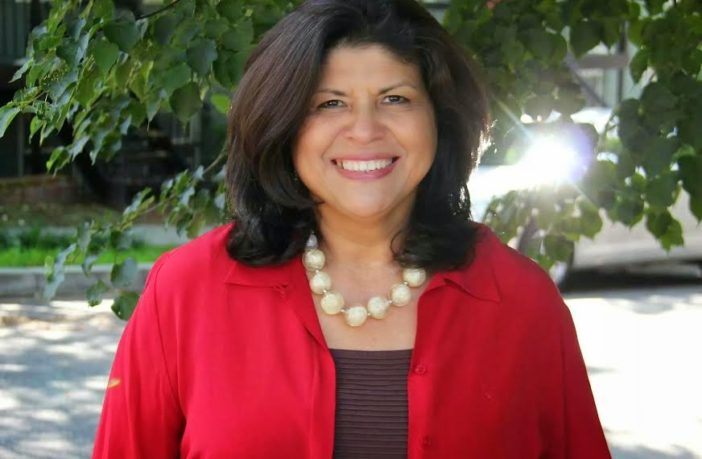Elections are coming up November 4th in DC, and one of the races being contested is the Ward 1 representative of the DC State Board of Education. In order to shine some light on a race that doesn’t get a lot of press, but is very important to local parents, I’m interviewing the four candidates for the board: David Do, Lillian Perdomo, Laura Wilson Phelan, E. Gail Anderson Holness and Scott Simpson.
Yesterday was Laura Wilson Phelan, today is Lillian Perdomo. My questions are in bold, her answers after.
Why are you running?
 Aside from my unshakeable belief that our students have a fundamental right to attend quality schools, my decision to run for the DC State Board of Education is driven by a strong conviction that it is morally wrong that so many of our students are not reaching their full potential. I know that Ward One students have immense potential regardless of their background. In addition, I am uniquely qualified to take on this task because of my first-hand long-term knowledge of the school system-both its strengths and weaknesses- as a parent, an educator, and as an advocate on behalf of children and their parents. I also find encouragement in knowing that the majority of us constituents are fed up with the status quo, and that we are at a turning point, for which we all must come together to do what it takes for Better Schools and Student Success.
Aside from my unshakeable belief that our students have a fundamental right to attend quality schools, my decision to run for the DC State Board of Education is driven by a strong conviction that it is morally wrong that so many of our students are not reaching their full potential. I know that Ward One students have immense potential regardless of their background. In addition, I am uniquely qualified to take on this task because of my first-hand long-term knowledge of the school system-both its strengths and weaknesses- as a parent, an educator, and as an advocate on behalf of children and their parents. I also find encouragement in knowing that the majority of us constituents are fed up with the status quo, and that we are at a turning point, for which we all must come together to do what it takes for Better Schools and Student Success.
I experienced firsthand the challenges that our communities face- to be assured access to a quality education. My various perspectives include over 25 years of community organizing and advocating for DC children and families, including 9 years as an educational not-for-profit executive, five years as an educator in Ward One public schools, a parent, a PTA co-chair, and now, also, a grandparent of a Pre-K student. This past summer I coordinated the afterschool, Summer Arts Program at Bruce Monroe E. S.
How would you explain the role of the State Board of Education?
I explain the State Board of Education (SBOE) role as an educational advisor to the State Superintendent of Education, on setting statewide educational standards and state level policies, including those governing special, academic, vocational, charter and other schools; state objectives; and state regulations proposed by the Mayor or the State Superintendent of Education. The SBOE also convenes stakeholders (parents, educators, students, politicians and community) to work together on, community issues, needs, and desires, and advocates for equitable and meaningful practices to meet educational needs of Ward One students. The State Board is also responsible for approving a varied and wide-ranging set of policies that include very straight forward processes, such as approving residency verification rules, to approving statewide educational standards on what students must learn and are able to do in every grade level and in every subject area. SBOE is responsible for approving: high school graduation requirements; teacher licensing and certification rules; policies to foster parental involvement; approval of the categories and format of the District of Columbia’s annual “statewide” accountability “report card” that presents the results of federally mandated
student tests; advising the State Superintendent of Education on policy and legislation, if asked to do so. All of this information can be found at www.sboe.dc.gov.
Are there any major changes you would propose to the Board itself?
The oversight responsibilities of the State Board of Education must be strengthened. Federal and State mandates such as Title One, English Language Learning requirements and other areas must be overseen not only by the Board of Education, but by the State Education Agency. In government, I feel strongly, that we must have checks and balances not only for the public schools, but for the public charter schools as well.
Tell us your thoughts on the redistricting process, both the most recent and how it should be done in the future.
The new school boundary plan aims to increase predictability for school acceptance and reduce concentrated areas of lower performing schools in underserved neighborhoods. While the new plan seems to be a more equitable approach to school zoning, it is understandable that parents are unnerved about what the re-zoning means for their children’s education. However, the proposed roll out plan is a phased approached, allowing students 3rd grade and above to remain in their current schools and attend the high schools they were originally intended to attend, as well as their younger siblings. This approach will help families and neighborhoods to adjust over several years to the new boundaries. I look forward to working with Ward One parents to come together in an effort to promote the improvement of all our Ward One schools, so that when their children come of age to be part of the new boundary system, all schools are ready to deliver high quality education to all students attending. The new boundary system is missing a much needed charter and public school coordination of school location.
What’s the biggest problem DC schools face?
Since I am running for Education Board representative for Ward One, I will respond for Ward One. Ward One is comprised of 85% low income minority populations; 47% African American and 47% Hispanic/Latino. The primary issue facing our Ward One students is not achieving proficiency in reading and math skills. The 2014 DC literacy rates, while already low, have fallen since 2009 among both African-American students (from 41% to 39% proficient) and students learning English as a second language (from 47% to 36% proficient). As educators we know that learning takes many forms, therefore we must research and apply educational methodology that appeals to and is effective for those most at risk. We must also provide supportive education programs and wrap around services to help students reach their full potential and assist families to better support their children.
How did you get interested in running for the board, and do you have children in DC public schools?
I have always been interested in education, especially in advocating for the right to attend a quality school for students to receive a quality education. I have over 25 years of community organizing and advocating for DC children and families, including 9 years as an educational not-for-profit executive and five years as an educator in Ward One public schools. This past summer I coordinated the afterschool, Summer Arts Program at Bruce Monroe E. S. I am a parent of a DCPC graduate, a student that attends a DC public school and serve as a PTA co-chair. This fall I became a grandparent of a Pre-K student. Running for State Board Representative for Ward One means that I have an opportunity to work with and advocate for students and families to improve Ward One Schools so that each child, regardless of economic background has access to a quality education and supportive school run programs.
Where can people go to get more information about your campaign?
www.yesforlilian.com Thank you!




